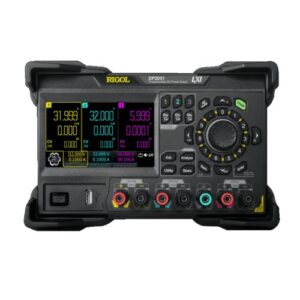In the ever-evolving world of electronics, precision, stability, and reliability are the cornerstones of successful innovation. Whether you’re working in a research lab, an educational setting, or an industrial environment, a high-quality DC power supply is an indispensable tool. These devices provide consistent and controllable direct current (DC) voltage and current for powering circuits, testing components, and supporting a wide range of applications in electronics development and testing.

What Are DC Power Supplies?
DC Power Supplies are electronic devices that convert alternating current (AC) from the mains into direct current (DC) used to power various electronic equipment and components. These units come in multiple formats, ranging from benchtop models for lab use to high-power industrial-grade supplies for automated test systems and manufacturing lines.
There are two main types of DC power supplies:
Linear power supplies, which offer low noise and high accuracy, ideal for sensitive measurements.
Switching power supplies, which are more efficient and compact, suited for high-current applications.
Key Features of Modern DC Power Supplies
Today’s DC power supplies go beyond basic voltage and current regulation. They are equipped with advanced features that make them suitable for diverse applications, including:
Digital Displays: Real-time monitoring of voltage and current output.
Multiple Output Channels: Supporting more complex circuits or simultaneous device testing.
Programmability: Enabling automation through USB, RS232, or GPIB interfaces.
Current Limiting: For protecting circuits during testing or experimentation.
Remote Sensing: Improving accuracy by compensating for voltage drops across wires.
Compact & Modular Designs: For space-saving and flexible installation in workbenches or racks.
By offering these features, modern DC power supplies provide the control and accuracy required for both simple and advanced electronic tasks.
Applications of DC Power Supplies
DC power supplies are crucial in various sectors where precision electrical control is required. Some common application areas include:
- Electronics Testing and R&D
In research and development labs, DC power supplies are used to power prototypes, run diagnostic tests, and simulate different operating conditions for electronic circuits and microcontroller-based systems.
- Educational Laboratories
Technical institutes and universities use DC power supplies in electronics and electrical labs for teaching students the principles of circuit design and troubleshooting.
- Telecommunication Equipment
Telecom infrastructure relies heavily on stable DC voltage for equipment like routers, repeaters, and base stations.
- Automotive Industry
Engineers use programmable DC power supplies to simulate battery performance and test vehicle electronics under various load conditions.
- Medical Equipment Testing
Precise voltage control is essential in testing and calibrating sensitive medical devices such as ECG monitors and infusion pumps.
- Battery Charging and Simulation
DC power supplies are used to charge batteries and also simulate them in devices under test (DUT) to ensure accurate performance evaluation.
Benefits of Using a Quality DC Power Supply
A high-performance DC power supply provides numerous advantages, especially in environments where accuracy and safety are non-negotiable:
Voltage & Current Stability: Ensures that connected components receive steady and accurate power.
User Safety: Overcurrent and short-circuit protection features prevent accidents.
Enhanced Productivity: Programmable models enable automated test setups, saving time in repetitive testing.
Component Protection: Proper current-limiting protects delicate semiconductors and integrated circuits.
For anyone involved in electronics work—be it education, development, or repair—a dependable DC power supply is one of the most important tools to have.
How to Choose the Right DC Power Supply
Selecting the right DC power supply depends on your application needs. Here are a few key factors to consider:
Voltage and Current Range: Choose a supply that matches the operational requirements of your devices.
Number of Outputs: Multichannel units are useful for testing multiple circuits or devices at once.
Accuracy and Resolution: Critical for sensitive or low-voltage applications.
Form Factor: Depending on your workspace, you may need a benchtop or rack-mounted unit.
Interface Options: For automation or remote control, look for USB, LAN, or serial interfaces.
Safety Certifications: Ensure compliance with electrical safety standards.
DC Power Supplies and the Future of Electronics
As electronics become more sophisticated and widespread—from wearable health monitors to autonomous vehicles—the demand for accurate testing and development tools will continue to rise. DC power supplies are central to this progress, allowing engineers to test designs under precise conditions and educators to prepare students for real-world challenges.
Additionally, the shift toward renewable energy and battery-powered systems emphasizes the importance of DC power in everything from solar inverters to electric vehicles. As such, investing in reliable DC power supplies is not just about meeting today’s needs—it’s about preparing for tomorrow’s technologies.
Conclusion
A reliable DC power supply is far more than just a lab accessory—it is a foundation for innovation, testing, and education in electronics. Whether you’re working on consumer electronics, industrial systems, or advanced R&D projects, a dependable DC power source ensures your systems perform as expected, safely and efficiently.
By choosing the right DC power supply, you empower your workflow with stability, accuracy, and flexibility. For any electronics lab or test environment, a high-quality DC power supply is not a luxury—it’s a necessity.